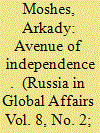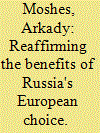| Srl | Item |
| 1 |
ID:
098021


|
|
|
| 2 |
ID:
070340


|
|
|
| 3 |
ID:
065746


|
|
|
| 4 |
ID:
111687


|
|
|
|
|
| Publication |
2012.
|
| Summary/Abstract |
This article argues that Dmitry Medvedev's term in office, despite the continuity in Russia's foreign policy objectives, brought about a certain change in Russia's relations with the European Union and the countries of the Common Neighbourhood. The western perceptions of Russia as a resurgent power able to use energy as leverage vis-à-vis the EU were challenged by the global economic crisis, the emergence of a buyer's market in Europe's gas trade, Russia's inability to start internal reforms, and the growing gap in the development of Russia on the one hand and China on the other. As a result, the balance of self-confidence shifted in the still essentially stagnant EU-Russian relationship. As before, Moscow is ready to use all available opportunities to tighten its grip on the post-Soviet space, but it is less keen to go into an open conflict when important interests of EU member states may be affected. The realization is slowly emerging also inside Russia that it is less able either to intimidate or attract European actors, even though it can still appeal to their so-called 'pragmatic interests', both transparent and non-transparent. At the same time, whereas the new modus operandi may be suboptimal from the point of view of those in the country who would want Russia's policy to be aimed at the restoration of global power status, it is the one that the Kremlin can live with-also after the expected return of Vladimir Putin as Russia's president. Under the current scheme, the West-and the EU in particular-does little to challenge Russia's internal order and leaves it enough space to conduct its chosen course in the former Soviet Union.
|
|
|
|
|
|
|
|
|
|
|
|
|
|
|
|
| 5 |
ID:
082065


|
|
|
|
|
| Publication |
2008.
|
| Summary/Abstract |
Ukraine may simply remain an exceptional case in the territory of the former Soviet Union - an interim transitional type, a country treading after its Central European neighbors, but never catching up with them as regards the development of democratic institutions or the degree of economic modernization. And yet it may implement the declared "European choice" in one form or another.
|
|
|
|
|
|
|
|
|
|
|
|
|
|
|
|